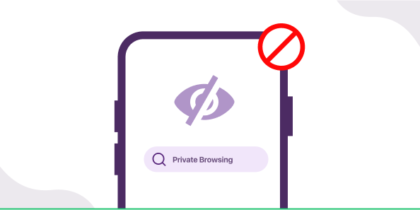Table of Contents
The US government has finally dropped the hammer – a TikTok ban is no longer a looming threat, it’s about to become a reality.
The app, an undeniable cultural force on nearly 170 million Americans’ phones since 2016, has become the soundtrack and visual diary of a generation. But unlike its social media predecessors, TikTok wasn’t born in Silicon Valley – it hails from China, and that’s where the apparent trouble begins.
Background
On March 13, 2024, the House of Representatives passed a bill forcing TikTok’s parent company, ByteDance, to sell the app or face a complete ban. The government is even flexing its muscle by threatening fines on major mobile app stores and cloud hosting companies to ensure Americans can’t access the app anymore.
This move raises serious questions about online freedom and the First Amendment. The CEO of TikTok, Shou Chew, himself argued the ban would be a blatant attack on free speech.
As we further explore this issue, it becomes increasingly evident that banning TikTok won’t erase its profound cultural influence. In fact, history suggests that most Americans will likely resort to VPNs to access the popular app.
This raises pivotal questions about the boundaries of online freedom and the protection of First Amendment rights in our ever-evolving digital landscape.
Read more: The shocking cost of a TikTok ban: Assessing its toll on the economy and online freedom
A Look at the VPN Usage in Countries with Social Media Bans
History is filled with examples of citizens turning to VPNs when faced with app bans.
Saudi Arabia
Take Saudi Arabia, for instance. A 2020 study titled “Cybersecurity Management for Virtual Private Network (VPN) Applications” revealed that a whopping 91% of respondents used free VPNs, primarily to access entertainment content blocked by the government.
The study also highlighted a lack of understanding regarding VPN security risks, underlining the need for user education. Moreover, it can be further supported by Google Trends. The following chart shows a relatively high level of search interest for “VPN” throughout the year 2020. This aligns with the study’s finding that a significant number of people in Saudi Arabia used VPNs.

Nigeria
Similarly, a 2021 study titled “The Impact of Virtual Private Network (VPN) on Nigerians during the 2021 Twitter Ban” explored the surge in VPN usage after the Nigerian government suspended Twitter.
The study found a significant decrease in Twitter use during the ban, with a corresponding rise in VPN adoption. Interestingly, the research also highlighted a rise in VPN awareness post-ban, showcasing the public’s growing interest in avoiding online constraints.
Google Trends data for the year 2021 definitively confirms this, as it shows an increase in search interest for “VPN” which aligns with the reported surge in VPN usage in Nigeria during that time.

Russia
Following Russia’s invasion of Ukraine in 2022, several social media platforms like Instagram and Facebook were reportedly restricted. News reports documented a surge in VPN downloads, with citizens seeking ways to access these platforms and stay informed about global events.
According to Global Security Mag, VPN usage in Russia increased by 167% in 2022. This case underlines the role of VPNs in ensuring access to uncensored information during times of political tension.
Not only this, Google Trends supports the claim that VPN usage surged in Russia following the invasion of Ukraine in the year 2022. It also depicts a steep rise in search interest for “VPN” following a period of relative stability.

China
The Great Firewall of China famously restricts access to many foreign websites and social media platforms. While using a VPN is technically illegal in China, estimates suggest millions of citizens still utilize it to access blocked content. According to VOA news, China’s VPN usage nearly doubles amid internet censorship.
Moreover, Google Trends for the last 5 years supports the claim that despite VPN being illegal in the country, numerous people search for the term “VPN”. This ongoing situation showcases the lengths people go to in pursuit of a free and open internet.

Also, Google Trends shows the relative popularity of searches for “VPN” across different regions. It highlights the 5 top subregions in China with the highest search volume for “VPN”. The subregion with the highest search volume is Ningxia, which has a score of 100.
It is important to note that Google Trends shows the relative popularity of a term over time. A score of 100 means that the term was searched for more than any other term related to VPN in China during the selected time period.

These examples demonstrate a global trend, when governments restrict access to online platforms, citizens often turn to VPNs to circumvent these limitations. The rise of VPN usage highlights the public’s desire for unrestricted information access and the challenges governments face in controlling online activity in the digital age.
The TikTok Conundrum: Balancing Online Freedom and Privacy
The social media landscape is constantly evolving, and TikTok, a platform known for its short-form videos, has become a global phenomenon.
But with its meteoric rise comes scrutiny, particularly concerning user data and potential national security risks. The question remains: would a complete ban on TikTok be the answer, or could it have unintended consequences for online freedom and privacy?
Moreover, in the United States, there has been a decline in support for banning TikTok, with around 4-in-10 Americans in favor of a ban, down from 50% in March 2023.
TikTok Ban Sparks Concerns About Freedom of Expression
Critics warn that a ban on TikTok could have a chilling effect on free speech. Several voices on X (formerly Twitter) expressed concerns that a ban on TikTok could stifle online expression.
One user highlighted that the bill to ban TikTok is passed potentially for censorship:
Another user takes a more impassioned stance, arguing that the ban is not just about security but about restricting free speech:
His tweet emphasizes the user perspective, highlighting the fear that the government is trying to silence voices online.
That’s not all, the podcast Stuff They Don’t Want You to Know adds a layer of intrigue, suggesting there might be broader implications for online freedom and suggests the ban could be part of a larger effort to restrict online expression.
Furthermore, another X user echoes this sentiment in a video, underscoring the fear that a ban on TikTok could be a stepping stone towards broader restrictions on online freedom.
While data collection by TikTok is a concern, a ban wouldn’t address the broader issue of online privacy. A complete ban presents a blunt instrument with potentially serious downsides.
Beyond the Bill to Ban TikTok
The ban looms, and whispers of VPNs are already echoing across the trendsetting corners of the internet. But why should Americans care about VPNs?
Because a TikTok ban won’t erase the app’s cultural footprint. The history, as evidenced by India’s 2020 ban, suggests many users would simply work around these restrictions with VPNs. It speaks volumes because when faced with a ban, Americans will likely follow suit.
Think of it this way: a ban is like slamming a door shut on a vibrant online community. But with a VPN, Americans can crack open a backdoor, peeking into the world of TikTok uncensored.
This wouldn’t be about defying authority, but about protecting the right to access information and entertainment – the very foundation of a free internet.
VPNs, once associated with hackers, are becoming increasingly common. They offer a shield against data snoops and a key to unlocking global content. In a world increasingly concerned with data privacy, VPNs offer a cloak of anonymity – something many Americans might find appealing.
The VPN Revolution: A Wake-Up Call for a More Open Internet
While some might argue a ban is necessary for national security, the question remains: is a blanket ban the smartest solution? Wouldn’t addressing the broader data privacy concerns be a more sustainable approach?
The bill to ban TikTok is a wake-up call. It’s a reminder that the internet shouldn’t be a walled garden, and that access to information is a right, not a privilege.
So, the next time you hear whispers of a VPN revolution, don’t scoff. It might just be the only way to keep the digital curtain raised on the world of TikTok – and maybe, just maybe, spark a conversation about a more secure and open internet for all.
Conclusion
The intricate interplay between national security concerns, user desire for a free internet, and the limitations of app bans highlight the need for a more nuanced approach.
While VPNs might offer a temporary solution for some, they expose a deeper issue: the lack of robust data privacy regulations. Focusing on comprehensive data privacy laws could be a more sustainable solution than targeting individual apps.
However, amidst this digital landscape, selecting a premium VPN service like PureVPN emerges as a beacon of assurance. PureVPN not only addresses your online security and privacy concerns but also elevates your browsing experience with features designed to safeguard your digital footprint.
With military-grade encryption, a strict no-logs policy, DNS Leak protection, and robust security protocols like WireGuard, PureVPN ensures that your online activities remain shielded from prying eyes.
Moreover, PureVPN goes beyond mere protection, offering an intuitive user interface and seamless connectivity across devices. Its global network of servers ensures lightning-fast speeds, allowing you to stream, browse, and communicate with unparalleled ease.
As the situation surrounding the TikTok ban continues to evolve, stay informed with the latest updates, potential workarounds, and ongoing discussions on online privacy by following PureVPN Blog.
With PureVPN as your trusted ally, navigate the digital landscape with confidence and peace of mind.
Read more: How geopolitical tensions are reshaping the online landscape and fueling the rise of VPNs



